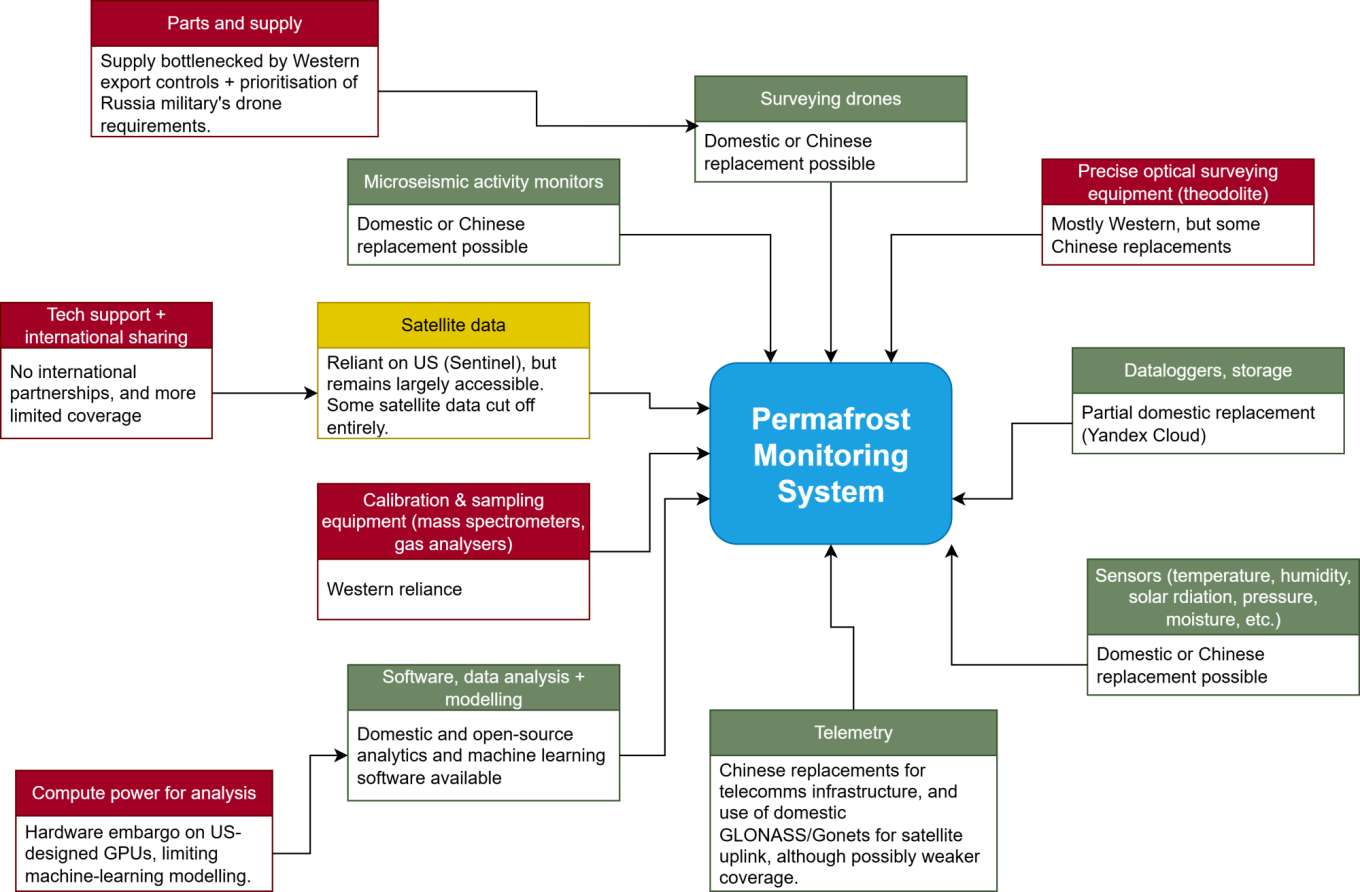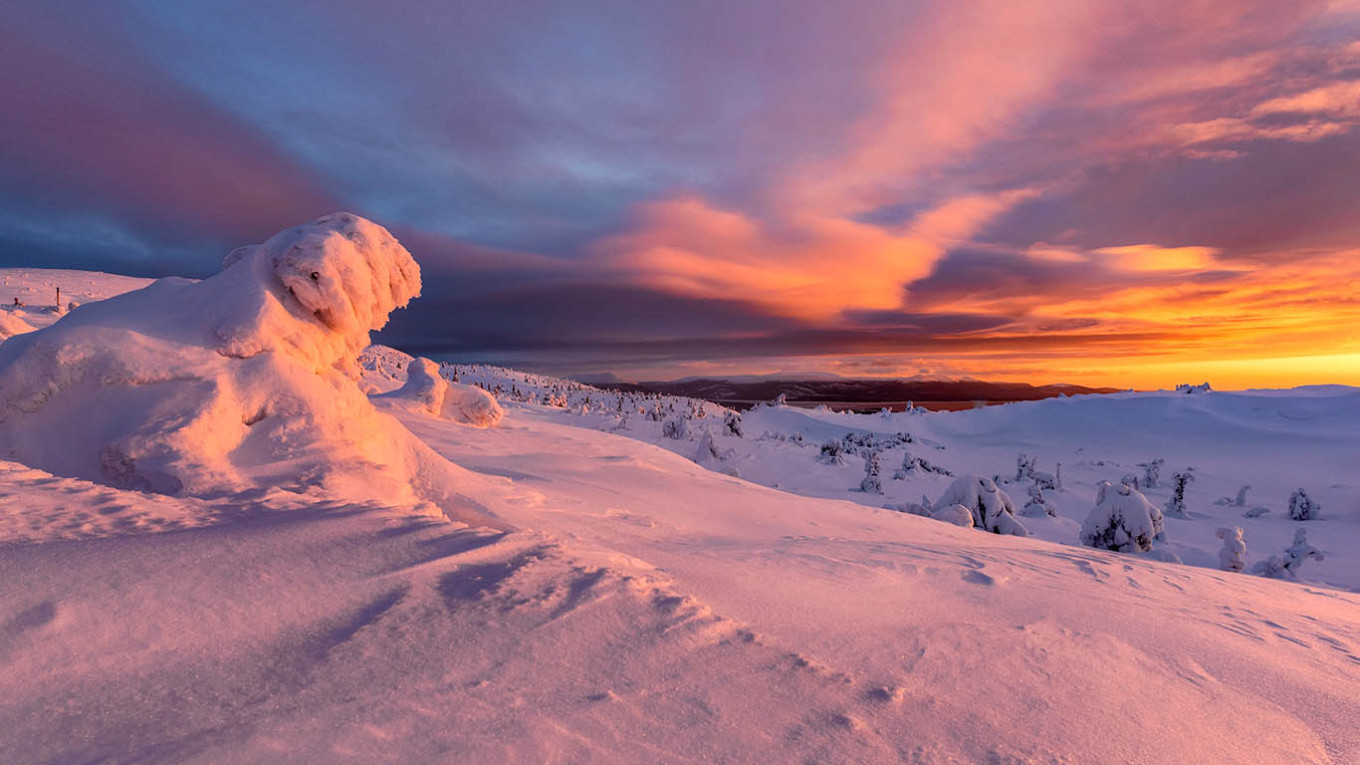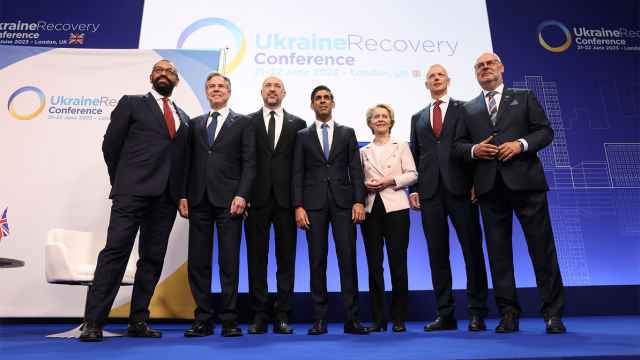The warning signs are clear in the Far North, where Russian and Alaskan towns are literally sinking into the ground. The hard permafrost on which their community and infrastructure were built is melting away, destroying lives and releasing greenhouse gases into the atmosphere.
Western export controls against Russia, enacted after President Vladimir Putin’s 2022 invasion of Ukraine, prevent access to the technology Russia could use to stem such climate change issues.
Emissions throughout the Arctic have ballooned in recent years. Alaskan permafrost warmth records broke in 2024 and the region now emits more carbon than it absorbs.
For Russians, the Arctic looms large: a vast frozen bulwark full of untapped potential, the development of which Putin heralded as “the future of Russia.” Putin’s speech at Russia’s International Arctic Forum earlier this year reaffirmed the importance of the Arctic in the eyes of the Kremlin and recognized the climate change challenges faced.
Contrary to the impressions given by caricatures of the Kremlin, their policies recognize climate change as a manmade issue requiring action. Russia knows it is warming 2.5 times faster than the global average, resulting in a government-predicted cost of 3% of the country’s GDP by 2030.
But efforts to mitigate this are limited and pragmatic. Cleanup efforts and a strong rhetoric exist, but Russia has consistently undershot international climate finance contributions and emissions targets according to international bodies, choosing to craft a policy around enabling fossil fuels, rather than replacing them.
The Kremlin uses an aggressive carbon offset strategy, attempting to sequester carbon instead of reducing emissions — allowing them to continue extracting valuable fossil fuels. Despite an impressive level of reforestation, aided by a natural greening of the Arctic caused by global warming, Russia’s forests cannot sequester enough carbon to offset emissions effectively.
The policy may be far from activist ideals. But swathes of the Arctic remain in Russia’s hands, and the rest of the world is reliant on their ability and willingness to engage in any climate change project, making cooperation key.
Any Russian efforts could be hampered by Western export controls, which limit access to the technology required for critical climate change research and emissions reduction projects. Pre-war, Western companies saturated Russia’s Arctic and were often involved in tech-reliant, climate-related projects.
Siemens, which exited Russia in 2022, partnered with Russian natural gas provider Novatek in 2020 to improve energy efficiency and reduce emissions at LNG facilities with the help of proprietary equipment and digital technology. ABB, which left in the same year, provided key automation and environmental performance technologies to lower emissions and improve safety in polar navigation for Russia’s Arctic shipping.
Meanwhile, Western resource extraction firms Exxon and Halliburton also left a perhaps unintended climate impact on Russia’s Arctic. Their exits in 2022 put a premature end to grand resource extraction projects in Russia’s north. This reduced total fossil fuel output, but meant Russia had to resort to less efficient resource extraction methods — lowering yield and increasing emissions.
Russia’s post-war LNG projects are in part struggling due to “multiple dependencies on unique technologies,” with Russia trying to tempt Exxon back so it can provide Russia a constant supply of foreign-made equipment, spare parts and technical assistance.
Russian efforts to monitor permafrost change rely on investment, cooperation and critical Western technology. In return, the rest of the world relies on access to Russian permafrost data.
Russia and the West have reciprocally stopped data sharing since 2022. Without input from the largest permafrost environment, scientists are left with half a picture, leading governments and scientists to fly blind while extractive activities press on.
Russia’s permafrost monitoring and arctic infrastructure project was launched in 2023. The project tracks changes in the layer of frozen ground covering swathes of the country, informing remediation required to protect cities, industry and transport links from the damage caused by permafrost melt.
Some operational parts are not cutting-edge, allowing Chinese imports to replace parts and for Russia to claim the project is possible domestically. But it is in the ancillary parts of projects, such as calibration and research equipment, which often rely on Western suppliers, hindering maintenance and development.

Other barriers to climate projects can include survey drones and even bans on cloud platforms and data analytics software like Amazon Web Services and Microsoft Azure. Russian tech giant Yandex hurriedly stepped up to the plate with a homegrown platform after Amazon and Microsoft’s departures in 2022.
Russian permafrost monitoring and similar projects have not yet completely shaken reliance on the Western tech stack. Beijing can, and will, close many gaps, but full equivalence — the certified, long-term support chains that underpin international science and high-end engineering — appears a more distant prospect, leaving the West with the key to climate project success.
Aside from specific export controls on dual-use goods used in climate change projects, Russia’s wider isolation from the West also affects the Arctic indirectly: reducing maritime safety and emissions compliance, slowing financial growth, eroding trust in cross-border research projects and reorienting Russia towards a war economy.
Russia boasts a world-leading fleet of icebreakers and Arctic vessels. But the loss of technical expertise and non-compliance with international maritime standards can result in lengthy, domestic refits — and an increased risk of climate disaster from lower technical standards.
Even with Western tech, Putin’s protracted war in Ukraine has put Russian climate change investment on the back burner; unbridled access to climate technology is no guarantee it is deployed. The war economy devours funds once meant for climate projects and squeezes more emissions from already straining fossil fuel sites.
Data from state statistics service Rosstat shows an increase in the number of climate change adaptation plans since the war began; from eight sectoral and one regional plan in 2021, to 10 sectoral and 78 regional plans in 2024. Despite perhaps positive intent, funding for such projects has been diverted since the outbreak of the war and renewable electricity generation has steadily declined since 2021.
Sanctions against Russia have a negative effect on global climate goals, preventing access to critical technology. But their removal is not a silver bullet against the crisis facing the Arctic.
Policymakers are left with a tough choice: handicap Russian efforts to alleviate climate change through export controls, or relax controls and risk Western tech swarming the front lines.
One thing that is certain is that to avoid future disaster and survive in the long term, the international community must balance both a hot war and a quickly heating Arctic.
A Message from The Moscow Times:
Dear readers,
We are facing unprecedented challenges. Russia's Prosecutor General's Office has designated The Moscow Times as an "undesirable" organization, criminalizing our work and putting our staff at risk of prosecution. This follows our earlier unjust labeling as a "foreign agent."
These actions are direct attempts to silence independent journalism in Russia. The authorities claim our work "discredits the decisions of the Russian leadership." We see things differently: we strive to provide accurate, unbiased reporting on Russia.
We, the journalists of The Moscow Times, refuse to be silenced. But to continue our work, we need your help.
Your support, no matter how small, makes a world of difference. If you can, please support us monthly starting from just $2. It's quick to set up, and every contribution makes a significant impact.
By supporting The Moscow Times, you're defending open, independent journalism in the face of repression. Thank you for standing with us.
Remind me later.






